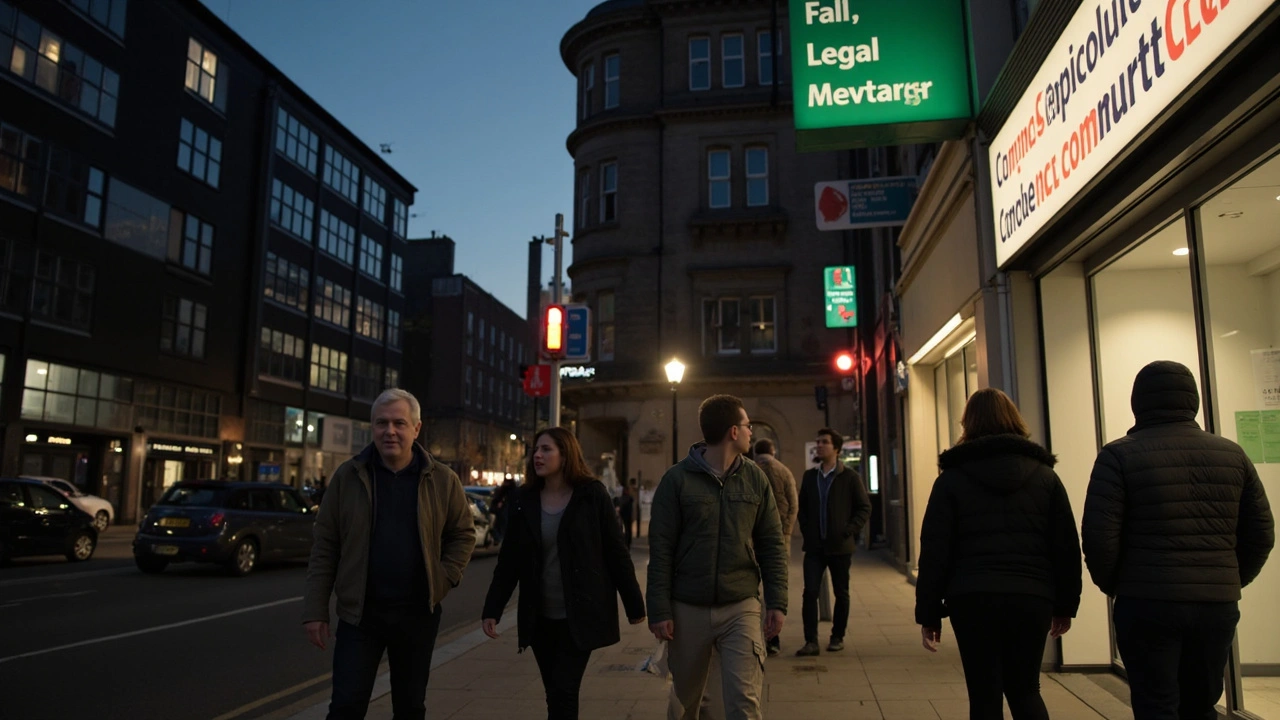Are Sex Worker Laws Fair Today? Legal Realities & Everyday Impact

Ever feel like nobody actually explains what the law means for real people working in sex work? You’re not alone. Today’s sex worker laws are a mess of contradictions. In some places, selling sex is legal but buying it isn’t. Some cities have crackdowns, others look the other way. The rules aren’t just confusing—they can shape people’s lives overnight.
If you or someone you know is trying to navigate this scene, you need more than legal jargon or old stereotypes. How do these laws actually work in practice? Who do they protect? And who ends up on the short end? Whether you're a worker, an ally, or just curious, let's break down how fair—or unfair—these laws really feel once you get past the surface. Get ready for stories, surprises, and tips you won’t find in your typical law book.
- Key Points You Should Know
- Quick Take: Are Sex Worker Laws Actually Fair?
- Why Sex Worker Laws Matter in Daily Life
- What the Laws Really Say and Where They’re Changing
- The Real-World Impact: Voices and Stories
- Staying Informed and Safe: Practical Advice
Key Points You Should Know
Let’s cut straight to what actually matters when we talk about sex worker laws in 2025. There’s a lot of noise out there, so here are the essentials:
- Sex work is legal in some places, criminalized in others. You’ll find everything from full decriminalization (think New Zealand) to places where everything, including just texting about it, can land someone in handcuffs.
- Decriminalization and legalization are not the same thing. Decriminalization means removing criminal penalties, while legalization brings in rules and permits. This difference totally changes life for sex workers.
- Safety is a big concern. Legal crackdowns have pushed a lot of work underground, making safety nets harder to find. According to a 2023 survey, over 60% of sex workers in criminalized settings said they felt unsafe contacting the police.
- Stigma is everywhere, even where it’s legal. Laws can affect medical access, custody rights, and whether someone can get another job later.
- Enforcement hits certain groups harder. Stats from the US show that Black and trans sex workers are arrested at much higher rates than others in major cities.
- Buyers and workers face different risks. Some countries punish the buyer (like Sweden). Others target the worker (like the US in most states). This shapes everything from how business is done to whether workers can demand safe conditions.
| Country | Status in 2025 | Notes |
|---|---|---|
| New Zealand | Decriminalized | Workers have labor rights |
| Germany | Legalized | Strict regulation |
| United States | Mostly Illegal | Except Nevada (some counties) |
| Sweden | Buyers Criminalized | Workers not punished |
If you remember anything, let it be this: Understanding the actual law where you live—or travel—matters a ton. It’s the difference between being safe and ending up in a really tough spot. These laws aren’t just random rules—they shape men’s, women’s, and non-binary folks’ day-to-day lives in ways most people never see.
Quick Take: Are Sex Worker Laws Actually Fair?
Here’s the truth: sex worker laws are all over the map, and most of them feel outdated or just plain unfair if you ask people working in the industry. In the U.S. as of May 2025, the old-school rules are mostly still in place. Full-service sex work (think escorting or street work) is illegal pretty much everywhere except a few small counties in Nevada. Yet, activities that aren’t that different—like porn acting or private online shows—are usually legal as long as there’s a camera involved and everything is “work for hire.”
This double standard trips up a lot of people. It’s hard to square the idea that posing for a website is legal, but meeting someone in private isn’t. Laws don’t just block workers—they can push people into dangerous situations because hotel bans, website takedowns, and undercover police stings force everything underground.
Fairness gets even shakier when you add in how these laws are enforced. In bigger cities, police might focus on trafficking cases, but in smaller towns, workers still get arrested just for showing up. Stats from the Urban Justice Center show that in 2024, over 90% of prostitution arrests in New York targeted people with no signs of coercion or force—just folks trying to make a living.
| Type of Sex Work | Legal Status | Exceptions |
|---|---|---|
| Full-Service (e.g., escort, street work) | Illegal | Nevada brothels (limited counties) |
| Pornography (recorded) | Legal | Must be filmed; paperwork required |
| Online Sex Work (cam, OnlyFans, etc.) | Legal | Platform rules matter |
Even when laws claim to “protect” sex workers, people working the job say it rarely feels that way. Many can’t call the cops if they’re in danger without risking arrest. Plus, crackdowns usually hit street-based workers hardest—often women, LGBTQ+ folks, and people of color. If you’re wondering about sex worker rights, this legal maze probably feels pretty one-sided.
So, are these laws fair? Most folks in the know would say no—they’re confusing and often do more harm than good. Instead of helping, the system ends up punishing people based on outdated ideas about morality and safety. If lawmakers listened to actual workers, things would look a lot different.
Why Sex Worker Laws Matter in Daily Life
If you’re thinking these laws are all about paperwork or courtroom drama, think again. The rules around sex worker laws set the tone for what can happen in a worker’s daily routine, their safety, health, and even their money. For a lot of people, what’s on the books decides how safe they feel heading to work — or if they can work without getting into trouble with the police.
Here’s a concrete example: in countries or states where sex work is criminalized, workers often have to keep things underground. That means taking more risks, not always being able to screen clients, or even being afraid to call the cops if something goes wrong. Amnesty International said it loud and clear:
"Criminalization forces sex workers to operate in the shadows, making them more vulnerable to violence and less likely to access health services or report abuse to police."
But it’s not all black and white. Some laws try to protect one side but not the other. For instance, Sweden’s model punishes buyers but not sellers. It was meant to help workers, but some say it just pushes the business into sketchier, hidden places. And it’s not just about legal brush-ups. These laws decide your access to banks, renting apartments, even whether you can get health insurance without weird questions.
- In places where sex work is decriminalized, like in parts of New Zealand, reports show sex workers feel safer, can report crimes, and have fewer health problems.
- A study by The Lancet found that legal changes, especially removing criminal penalties, could help cut new HIV infections among sex workers by 33%.
- The laws even influence family life; some parents have lost custody because of sex work-related arrests, even if their job didn’t harm anyone.
Still, the reality is all over the map. One city can have red-light districts and strict rules, while just one town over, things are more relaxed. Here’s a quick peek at how the same person’s life changes depending on the law:
| Legal Area | Impact on Worker |
|---|---|
| Criminalized | Constant fear of arrest, hard to seek help, risky environment |
| Legalized/Decriminalized | More freedom, police protection, better healthcare |
So if you’re at all connected to this world — as a worker, client, family member, or even a policymaker — these laws aren’t just words. They decide if someone can be safe at work, keep their kids, or just live with less stress. Not exactly small stuff, right?

What the Laws Really Say and Where They’re Changing
Laws around sex worker laws are all over the place, and it honestly depends on where you are. In the U.S., for example, actual sex work—meaning trading sexual services for money—is still illegal almost everywhere except for a handful of tiny counties in Nevada. But here’s the thing: it’s not just about the act. Even things like advertising, renting a place to work, or just hanging around in the wrong spot can get someone arrested.
If you look at Europe, it’s a mixed bag. Germany and the Netherlands went for full legalization—sex work is legal and regulated like any other job. Sex workers there get health checks, work contracts, and pay taxes. Compare that to Sweden, which went with the “Nordic model.” There, selling sex isn’t illegal, but buying it is. The cops go after the buyers and, in theory, protect the workers. Has it helped? Plenty of Swedish sex workers say it just pushed their work underground and made things riskier.
Legal rights also differ wildly within the same country. For example, New Zealand fully decriminalized sex work back in 2003, which means workers there have the same labor protection as other jobs. A government review in 2022 found reports of less violence and workers more likely to seek help from police. That's a big deal compared to places where people risk jail just for asking for help.
So, what’s changing in 2025? In the last three years, lawmakers in New York and California have floated bills to decriminalize sex work—meaning no one goes to jail for buying or selling sex between consenting adults. These haven’t passed yet, but the fact that they keep popping up shows attitudes are shifting. Lawmakers in Australia are also moving to decriminalize in places like Victoria and Queensland, following New South Wales, where it’s already legal.
Here’s a basic breakdown to see how things stack up by region:
| Region | Sex Work Legal? | Regulation/Notes |
|---|---|---|
| Germany | Yes | Legal, regulated, workers licensed |
| Netherlands | Yes | Legal, with strict city rules |
| New Zealand | Yes | Decriminalized, labor rights |
| Sweden | No (buying illegal) | Nordic model |
| United States | Mostly No | Legal in parts of Nevada only |
It’s easy to get lost in the details, but here’s what matters: wherever laws get tough, workers often face more danger. When things get decriminalized, more people report feeling safer and more in control. If you want to push for fairer sex worker laws where you live, watch what happens in places like California, New Zealand, and Germany. They’re pretty much the real-time experiments shaping what comes next.
The Real-World Impact: Voices and Stories
Reading about sex worker laws is one thing—hearing what they mean for actual people is a wake-up call. These laws aren’t just background noise; they mess with real lives in ways that charts and official statements just can’t cover.
Let’s start with Bella, a single mom working as an escort in a decriminalized city. She says she feels safer meeting clients, but still worries about her landlord evicting her if word gets out. In cities where sex work is only partly legal, workers like Mia have been fined or even arrested just for texting potential clients. Even the police sometimes seem unsure about what’s allowed, which makes things even riskier.
Now, let’s get practical. Studies show decriminalization cuts down on violence against workers, and there’s real data behind that. In New Zealand—where buying and selling sex is fully legal—reports of assault dropped by nearly a third after the law changed. On the flip side, in countries with strict bans, workers often avoid the police even when in danger, just to keep their records clean. That means crimes go unreported and predators know they have less to fear.
| Country | Legal Status | Reported Assaults* (year after law change) |
|---|---|---|
| New Zealand | Legal & Decriminalized | -31% |
| Canada | Partial Legalization | -12% |
| Sweden | Legal for seller, illegal for buyer | No real drop |
*Based on local police data and surveys, 2017-2021.
The stigma sticks around, though. Even in friendlier cities, people like Dorian—just out of college and working online—hesitate to share what they do, scared of losing friends or jobs if people find out. And for those who want out of sex work, criminal records make it harder to land a "regular" job. That’s a trap the laws rarely fix.
What can you take from all this? The fairness of sex worker laws isn’t just about what’s written on paper—it’s about real lives, real safety, and whether the law helps or just gets in the way. If you care about people, it’s hard to ignore how these rules echo long after courts have spoken.
Staying Informed and Safe: Practical Advice
If you’re dealing with sex worker laws right now, staying sharp matters more than ever. The rules change fast, and what’s legal in one city might be illegal just a few miles away. Did you know that in the U.S., Nevada has legal brothels in some counties, but most states still criminalize most forms of sex work? That’s why checking local law updates regularly is key.
Knowing your rights isn’t just a nice idea—it’s your safety net. Here’s what you can do right now:
- Check local laws—Visit your city or county website. Many areas post clear outlines of current sex worker laws online, with updates after any changes. If it’s too confusing, there are advocacy groups (like SWOP or BSWC) who break it down in plain English.
- Low-key networking: Connect with sex worker-led organizations in your area. They hear about law enforcement sweeps or policy changes before anyone else. Being on their text or email list can give you a heads-up if something shifts overnight.
- Legal backup: There are hotlines and nonprofit legal clinics that help sex workers for free. Preparing a “know your rights” card or PDF on your phone can calm your nerves fast in a sticky moment.
If you’re worried about safety, combine street smarts with tech. Change up your work locations, use secure texting apps (like Signal instead of regular SMS), and trust your gut if something feels off. Always let someone know what you’re up to, even if that means a check-in with a friend rather than your parent or spouse.
Want a quick glance at support options? Here’s a cheat sheet you can use or share:
| Resource | What They Offer | How to Reach |
|---|---|---|
| SWOP-USA | Legal help, safety resources, updates on laws | Website / Local chapters |
| Red Umbrella Hotline | Emergency support, legal advice | 1-877-776-2004 |
| National Bail Fund Network | Bail support for arrested workers | Website directory |
| Stealth Apps | Safer texting & call apps like Signal | App Store / Google Play |
Last tip: never stop updating what you know. Sex worker laws keep shifting—even lawmakers and cops get tripped up now and then. The more you talk with people who are living it, the better prepared you’ll be to spot red flags, dodge trouble, and stand up for your rights if you have to.
